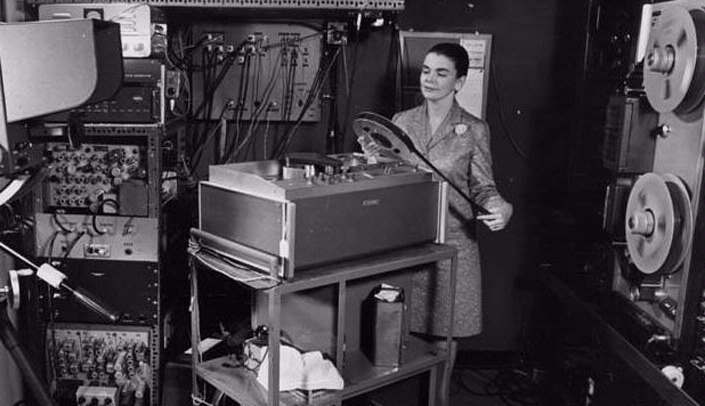UNMC was a pioneer in using technology to carry out distance education and telemedicine. An early form of teleconferencing was used to present educational conferences to a number of participating locations across Nebraska, as well as in other states.
This innovation was first proposed in 1955 by Cecil Wittson, M.D. (1907-1989), who at that time was head of the former Nebraska Psychiatric Institute (NPI), which was in existence from 1948 through 1985. The system was developed through the cooperation of the Bell Telephone Company. The system was used weekly to share the lectures of the psychiatric institute’s many nationally known visitors with other mental hospitals in four states.
The first two-way closed circuit television system in the U.S. was conceived by Dr. Wittson and developed and tested through grant support secured in 1963. This television system made possible face-to-face communication between the NPI, located on the medical campus in Omaha (now the site of Durham Research Center towers) and the Norfolk State Mental Hospital, located 112 miles away in Norfolk.
Dr. Wittson’s close associate in these telemedicine innovations was Reba Benschoter, Ph.D. Dr. Wittson was chair of psychiatry (1952-1964), College of Medicine dean (1964-1968), and the first chancellor of UNMC (1968-1972). Dr. Benschoter was later head of the UNMC Biomedical Communications Department, and from 1985 to 1995 she was associate dean of the School of Allied Health Professions.
In their 2009 book “History of Telemedicine: Evolution, Context, and Transformation,” authors Rashid L. Bashshur, Ph.D., of the University of Michigan, and Gary W. Shannon, Ph.D., of the University of Kentucky, called the period of time during which the Nebraska program was developed the “pioneering period” of telemedicine, from 1955 to 1972. The book features the Nebraska program along with other early programs in Massachusetts, New Hampshire, and Vermont.
Bashshur and Shannon wrote, “We single out Wittson and Benschoter as true visionaries and pioneers in the field of telemedicine. Wittson laid some of the basic cornerstones for the development of the field as a whole, not only for psychiatry but for clinical telemedicine generally.”
They continue: “Wittson reasoned that interactive television would ‘expand the reach of other medical specialties’ and that the medical profession should capitalize on this potential . . . Because it was the first use of two-way closed-circuit television for medical purposes in the country, the program generated nationwide interest . . .”

Thanks, John, for this "recollection." Dec. 2nd, 1964 marked the true beginning of telemedicine in the U.S. with the initiation of the UNMC-Norfolk system. It was truly a first for our institution and the world. It is remarkable to see what has happened with this technology in the fifty years since.
Reba Benschoter, Ph.D. Professor Emeritus
I worked at Nebraska Psychiatric Institute and loved reading this article!
Such fun to read this story and remember these pioneers. Dr. Benschoter continued to be a visionary in developing distance education to rural Nebraska. As Associate Dean of the School of Allied Health, she and Phyllis Muellenberg developed and delivered the first UNMC distance education program, the medical technology/clinical laboratory science program, in 1991.
It was an honor to work with Reba and Phyllis at UNMC!